
The future of our world – economically, socially, technologically and environmentally – hinges on the evolution of energy systems, networks and infrastructure.
From advanced manufacturing to water, global security and beyond, the industries that form the backbone of prosperous communities and economies depend on resilient, sustainable and secure energy. With decades of experience in overcoming the toughest challenges, we can help the world evolve the way energy is generated, moved and used, decarbonizing even the hardest to change industries and making the crucial shift toward energy security. Our Energy team, grounded in Jacobs’ global solutions expertise, thinks and acts systemically. We bring deep cross-market knowledge to meet clients where they are, solving energy and business challenges, in parallel.
We don’t just envision the future, we build it.
What we do
We help the world evolve the way energy is generated, moved and used, decarbonizing even the hardest to change industries and making the crucial shift towards energy security. Whether integrating renewable sources into a nation’s electricity grid or decarbonizing industries that form the backbone of society, we lay the foundations for, and scale innovation to make sustainable, secure energy a reality faster, for more people, across the world.
-

Renewable Energy
We’re co-creating clean generation solutions across a globally diverse team with strong multi-sector connectivity across power, energy, water, digital, manufacturing, transport, infrastructure and more.
-

Energy Storage
As the world turns to intermittent forms of renewable energy to reduce reliance on fossil fuels, energy storage will become increasingly important to provide short-and long-term balance in our power systems.
We’re at the forefront of energy storage including the design and feasibility of large pumped hydro energy storage projects; small and large-scale battery energy storage schemes (BESS); optimization of generation-pumping cycles; optimization of reservoir capacities for generation; pumping and provision of ancillary services and integration studies with existing generation assets.
-

Hydrogen
With the potential to decarbonize a broad spectrum of industries, hydrogen is receiving attention in many countries around the world as an alternative energy storage solution. As hydrogen production technologies evolve and renewable energy costs decline, large-scale zero-emissions hydrogen production may be more viable now than ever before. The broad utilization of hydrogen has potential to play an important role in our drive toward a decarbonized, sustainable future.
-

Transmission & Distribution
Serving as the connective tissue of an energy grid, transmission and distribution (T&D) networks are facing a paradigm shift. Existing gas and coal-dependent energy infrastructure is being modernized to accommodate the amount of renewable energy necessary to meet net-zero targets and build sustainably.
This ranges from new High Voltage Direct Current (HVDC) / High Voltage Alternating Current (HVAC) transmission grids accommodating large offshore generation projects to smart distribution networks that are able to absorb large demands from electric vehicles (EV) and other distributed energy resources.
Our team supports global utilities, renewable developers and conventional generation owners/operators in all project phases ranging from pre-feasibility studies, navigating various development and interconnection milestones, to engineering design, procurement, installation, commissioning and operation.
-
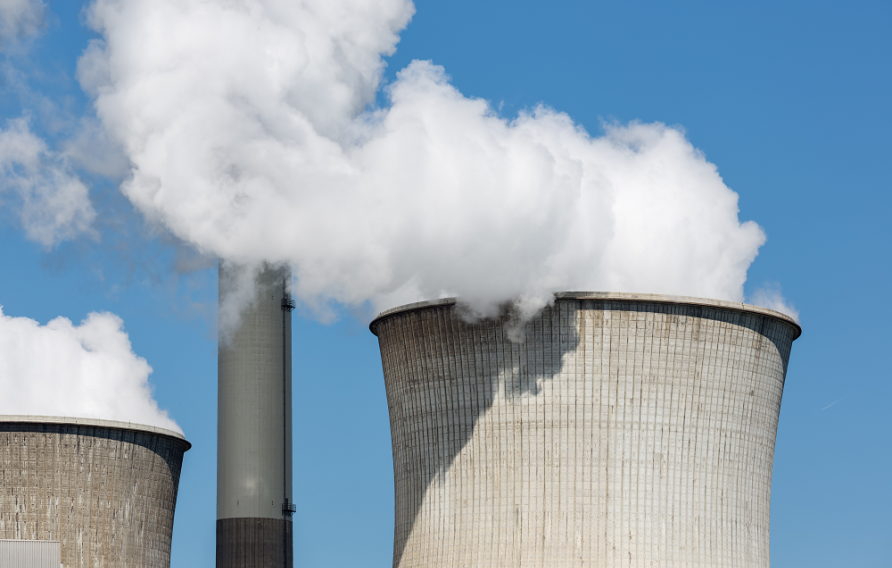
Thermal Generation & Distributed Heat
We’re leading the transition with lower emission base load alternatives such as high efficiency combined cycle gas turbines (CCGT), biomass generation facilities and energy-from-waste (EfW). Carbon capture and storage (CCS) solutions are a key part of meeting the decarbonization challenge.
We’re designing and implementing efficient combined heat and power (CHP) and district energy projects for utilities, private and public sector entities, including universities, health care campuses, federal agencies and businesses. We tackle the interrelated tasks and processes - from detailed planning through implementation addressing all aspects of efficient and reliable CHP project development.
-
Explore our projects
We're delivering solutions around the world, driving the transition toward a sustainable energy future.
-

Marinus Link, Australia
As integrated delivery partner, we’re managing engineering and construction for the first 750-megawatt stage of Marinus Link — a 345-kilometer high-voltage direct current (HVDC) undersea and underground interconnector supporting energy security and renewable power for Australia’s National Electricity Market.
-
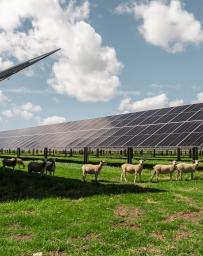
Lodestone Energy’s Solar Farm Program
Jacobs, acting as Owner’s Engineer for Lodestone Energy, is supporting the development of utility-scale solar farms in New Zealand. The project contributes to the country's low-emissions future by helping reduce reliance on fossil fuels and increase the proportion of renewable energy generation in the network.
-

Carbon Capture Program Support, UK
We’re delivering technical project management and strategic advisory services, with strategic partner PA Consulting, for the U.K. Department for Energy Security & Net Zero’s Carbon Capture, Usage and Storage (CCUS) program.
-
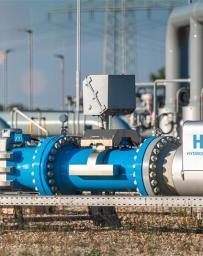
East London Hydrogen Pipeline, UK
We’re delivering the Pre-Front End Engineering Design (Pre-FEED) phase of the East London Hydrogen Pipeline (ELHP) project. The pipeline will span 90-kilometer (56 miles) through East London.
-
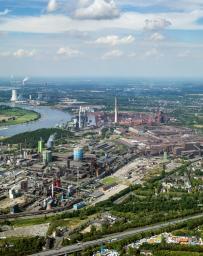
thyssenkrupp
As Program and Construction Management (PMCM) partner for tyssenkrupp’s $2.5 billion effort to decarbonize its steel mill in Duisburg, Germany, we’re exploring new processes using green hydrogen for iron reduction, replacing traditional coal-powered blast furnaces with hydrogen-powered electric smelters.
-

Louisiana Offshore Wind Roadmap
The Louisiana Department of Energy and Natural Resources (LDENR) selected Jacobs, in collaboration with PA Consulting and Xodus, to help develop a Comprehensive Offshore Wind Roadmap that aims to promote energy independence, diversification, and security in the state while developing the state’s workforce and local economy. With the goal of developing five gigawatts of offshore wind by 2035, the roadmap will help develop an approach towards energy independence and diversification for the state of Louisiana.
-

PacWave South Wave Energy Testing Facility
Supporting renewable, new energy technology, security and energy resiliency efforts, we completed the underground engineering for the HDD company, the design-build contractor, for Oregon State University’s PacWave South commercial-scale, ocean wave energy testing facility – the first pre-permitted, full-scale test facility for wave energy devices in the U.S.
-

National Grid Management Consultancy Framework
As part of National Grid’s General Management Consultancy Framework, we’re providing service operations support across the energy utility’s U.K. and U.S. operations to help improve core business functionality, including strategic development, business planning, process improvement and implementation support.
-

Electreon In-Road Inductive Vehicle Charging
We’re teaming with Michigan Department of Transportation, the Michigan Office of Future Mobility and Electrification, the City of Detroit, Next Energy and Electreon, a leading provider of wireless charging solutions for EVs, to deploy one of the first public wireless and inroad wireless systems for charging electric vehicles in the U.S.
-

Suedlink
Delivering a new 700 kilometer (km) underground cable connection, the $11 billion SuedLink project will help to better integrate renewable sources, such as wind and solar power, into Germany’s electricity grid, and also link with interconnectors to provide cross-border energy resilience. Jacobs is providing an integrated delivery partner approach to program and contract management, planning and approvals, stakeholder engagement, logistics, technical and other services on behalf of TenneT and TransnetBW respectively.
-

Long-Duration Underwater Energy Storage Pilot
We’re working with BaroMar, an energy storage innovation company, to develop the preliminary design for a first-of-its-kind underwater large-scale, long-duration energy storage pilot project. Located off the coast of Cyprus, the project addresses the growing demand for sustainable energy solutions by demonstrating the practical application and scalability of new technology that is simple, efficient, cost-effective and environmentally friendly.
-

National Gas Hydrogen Backbone Pre-Front End Engineering Design
We’re working with National Gas, the U.K.’s national gas transmission operator, to develop Strategic Route Options and Pre-FEED studies as part of their Project Union program. Project Union is a pioneering project led by National Gas to create a British “hydrogen backbone,” capable of transporting 100% hydrogen, connecting hydrogen production and storage with energy consumers across the U.K.
-
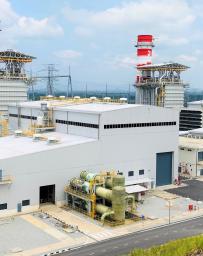
Project Melaka
Malaysia's largest Combined Cycle Gas Turbine power plant in Melaka has entered full commercial operation, generating approximately 2,242 megawatts of high-efficiency, lower-carbon power, helping fulfill 10% of the country’s electricity demand.
-
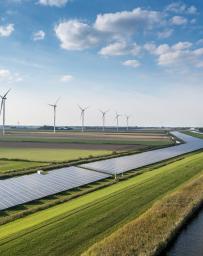
Fortescue Global Engineering Agreement
As part of an Engineering Partnership Agreement with Fortescue, Jacobs is supporting them on a variety of decarbonization projects from concept through Final Investment Decision to support its global ammonia, green hydrogen and renewable energy project targets.
-

Mission Sellindge
When a critical interconnector site was severely damaged by fire, rebuilding it in record time required teamwork, innovation and Project 13 Principles. Mission Sellindge is the remarkable story of how five years of work were condensed into just 16 months, resulting in an award-winning comeback.
-
Grand Coulee Modernization Program, US
As owner’s consultant, we’re providing engineering, project management and advisory services for Bonneville Power Administration’s modernization of transmission infrastructure at Grand Coulee Dam—enhancing reliability and efficiency at the largest power-generating dam in the U.S.
Meet some of our team
Read more about the talent who make it happen every day.
-

Pete Adams, Vice President, Global Market Director Energy & Power
Reducing emissions and reaching “net zero” on a global level will be one of the world’s largest and most pressing challenges of the coming decades. The impacts of climate change have become dramatically more noticeable in recent years, and it’s paramount that we act now if we want to tackle this problem in a significant way. As Global Director for Power, Pete Adams' role is about working with Jacobs' clients and teams across the world to develop strategies and implement projects that integrate an optimal mix of green energy generation, storage solutions and electricity infrastructure to achieve a successful energy transition that reduces emissions, supports reliability and strengthens livability outcomes for our communities.
-

Lara Kruk, Substations Technical Director, Asia Pacific
Whether it’s developing virtual transmission lines or implementing sustainable solutions for substation infrastructure, Jacobs Regional Solutions Director for Energy & Power, Asia Pacific, Lara Kruk, is committed to helping clients respond to the rapid pace of change caused by the energy transition. With a career spanning two decades working on transmission and utilities projects across Australia, New Zealand, the U.K., Iraq and Libya, Lara has undertaken a diverse range of technical and management roles. Lara supports the pivotal role Jacobs plays in addressing the global climate emergency. She actively advocates for new technologies or different construction methodologies to reduce capital expenditures by assisting renewable developers in making their projects viable and helping to increase the renewables percentage in the generation mix.
-

Freddie van der Linde,Director of High Voltage Electrical Transmission and Distribution and Market Solutions Lead
Throughout his career, Freddie van der Linde has learned that delivering at scale requires a completely different mindset and sense of urgency in the race to develop power systems fast enough to allow decarbonization of our economies and communities. Today, as Jacobs Global Solutions Director, Transmission & Distribution, Freddie acknowledges that achieving decarbonization goals requires specialism, but also requires multi-faceted experience to anticipate the impact of dramatic changes that are needed as a result of climate change and are occurring out of necessity.
-

Andy Solberg, Global Solutions Director for Decarbonization
Andy Solberg is Jacobs’ Global Market Solutions Director for Decarbonization within Energy and Power where he focuses on solutions that enable resilient 24x7 carbon free energy to data centers, manufacturing facilities, water treatment facilities, transportation systems, buildings and more. He has over 27 years of experience in net zero building design, manufacturing facility design, energy master planning, system simulation, and implementation of renewable energy and energy storage. He and his family “walk the talk” and are well down the path of decarbonization. He has decarbonized most everything. house, cars and hobbies (backpacking, sailing, backcountry skiing) and uses a mix of onsite solar and utility green power for their daily lives.
-

Julian McDowell, Geothermal Resources Market Lead
Geothermal Resources Market Lead Julian McDowell is leaping into the next phase of his career. After starting his career in Ireland as a hydrogeologist, Julian transitioned into the geothermal market during a postgraduate certificate in New Zealand. He joined Jacobs in 2010, traveling globally to work on various geothermal power projects. While he left Jacobs for five years to work for a utility company, he returned to add expertise and growth within our geothermal market in North America.
-

Lindsey Tollefson, Energy & Power Senior Program Manager
Energy & Power Senior Program Manager Lindsey Tollefson loves learning new things, making it a point across her career to tackle a vast array of multidisciplinary projects and programs. Lindsey has done it all, from managing a public-private partnership program for the U.S. Department of Energy, to developing clean energy projects and smart motor systems, or even a stint in the defense technology industry. After joining Jacobs, she was excited to see the vast array of opportunities in the energy transition space and market. Always ready to learn, she is now tackling hydrogen programs and looking forward to working in a new area of Jacobs and the energy market.
Read our latest news
From new project wins and milestones to reports, podcasts and industry insights, discover what we’re up to.
-
 News
NewsJacobs Appointed Integrated Delivery Partner for Marinus Link
Jacobs was selected as the Integrated Delivery Partner for Marinus Link, an approximately 214 mile (345-kilometer) undersea and underground high-voltage direct current (HVDC) electricity and data interconnector designed to bolster energy security, promote renewable energy investment and deliver tangible benefits to consumers in Tasmania, Victoria and the broader National Electricity Market.
-
 News
NewsJacobs Secures U.K. Department for Energy Security & Net Zero Professional Services Framework
Jacobs has been appointed by the U.K. Department for Energy Security & Net Zero to provide multi-disciplinary consultancy and advisory to the Energy and Net Zero Professional Services Framework, a critical initiative to support the U.K.’s energy security and net zero ambitions.
-
 News
NewsJacobs, PA Consulting and Xodus to Deliver Comprehensive Offshore Wind Roadmap for Louisiana Department of Energy and Natural Resources
The Louisiana Department of Energy and Natural Resources (LDENR) has selected Jacobs, in collaboration with PA Consulting and Xodus, to develop a Comprehensive Offshore Wind Roadmap to promote energy independence, diversification, and security while developing the state’s workforce and local economy.
-
 News
NewsJacobs, Electreon & the State Partner to Advance In-Road Inductive Charging Technology in Michigan
The Climate Change Business Journal (CCBJ) recognized Jacobs for teaming to deploy one of the first public wireless and in-road wireless systems for charging electric vehicles. In a follow-on CCBJ article, Jacobs Market Leader and Senior Project Manager Andy Wolpert answered questions about the award-winning project. Read the full article in this repurposed version on jacobs.com.
-
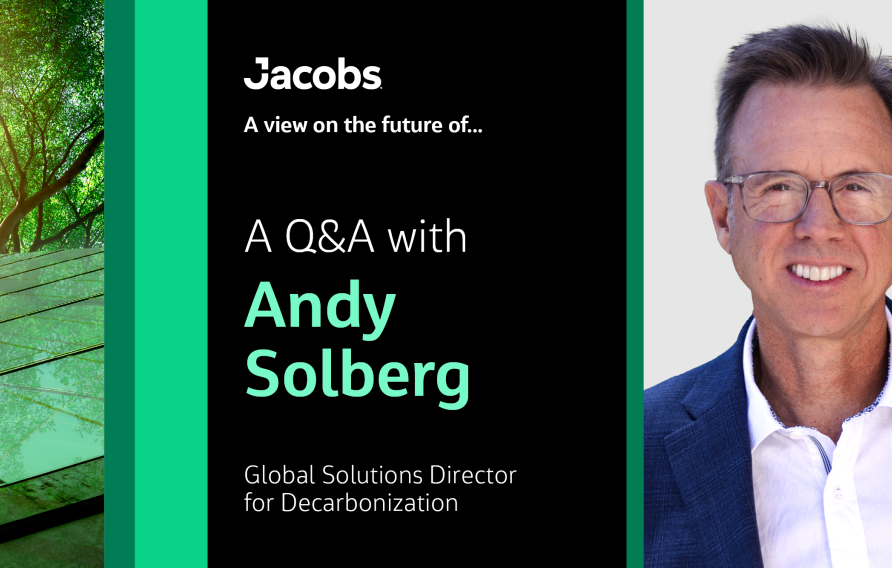 News
NewsA View on the Future of Decarbonizing Energy and Power: A Q&A with Andy Solberg
The future of our world hinges on the evolution of energy systems, power networks and supporting infrastructure across all sectors and geographies. In this Q&A, Jacobs Global Solutions Director for Decarbonization, Andy Solberg, discusses energy transition and how we’re turning the energy challenge into a growth opportunity for both our clients and Jacobs - laying the foundation for a more prosperous, sustainable future.
-
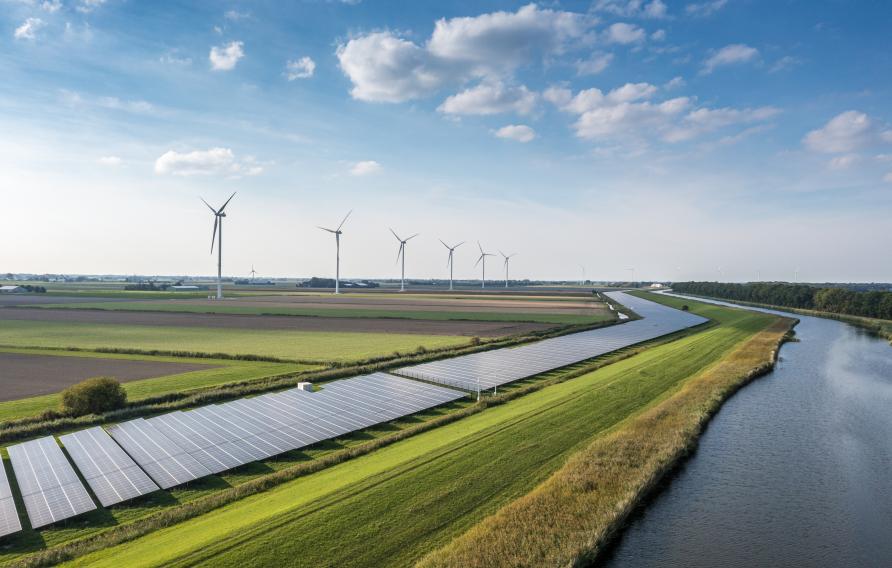 News
NewsJacobs Signs Global Engineering Agreement with Fortescue Future Industries
Jacobs (NYSE:J) has signed an Engineering Partnering Agreement (EPA) with Fortescue Future Industries (FFI) to support its global ammonia, green hydrogen and renewable energy project targets.
-

Regulatory and Policy Alignment for Transmission and Distribution Networks
This article looks at factors delaying the development of electricity transmission and distribution networks that are essential for decarbonization of power. Some challenges are legacy issues such as regulation of these natural monopolies, whereas others relate to the disconnect between governmental policies and regulatory frameworks. Jacobs Global Solutions Director for Transmission & Distribution Freddie van der Linde shares a view on accelerating the energy transition through supply chain development.
-
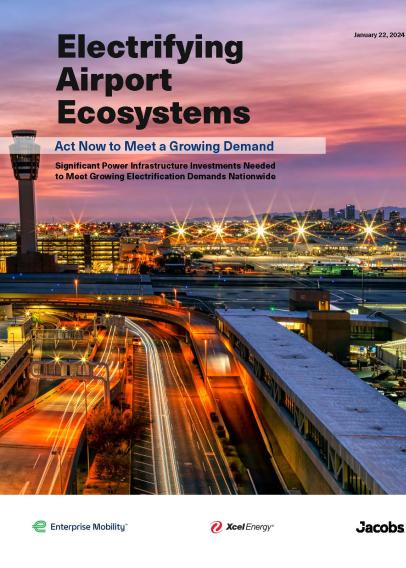
Electrifying Airport Ecosystems
This new study from Enterprise Mobility, Xcel Energy and Jacobs aims to raise awareness of the significant power infrastructure investments needed to support electrification in airport ecosystems nationwide.
-
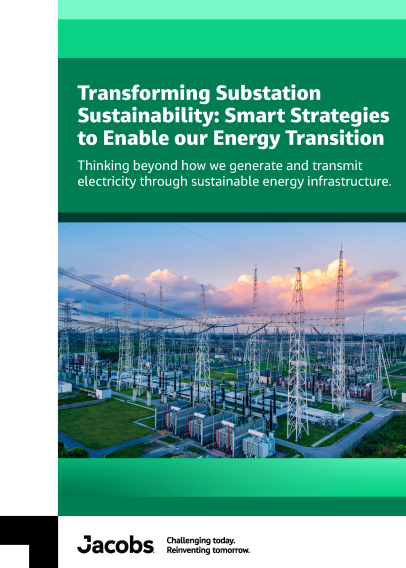
Transforming Substation Sustainability: Smart Strategies to Enable our Energy Transition
Regulators and governments will likely mandate emission reductions for energy infrastructure assets. Utilities need tools and strategies to implement sustainable solutions for substations to ensure communities have uninterrupted electrical service. We’ve curated a suite of sustainable substation solutions that can easily be used by utilities globally as they build their own ‘Substation Sustainability Toolbox.'
In the media
The AI Journal: From Gridlock to Greenlight: Solving the Great AI Power Squeeze













































